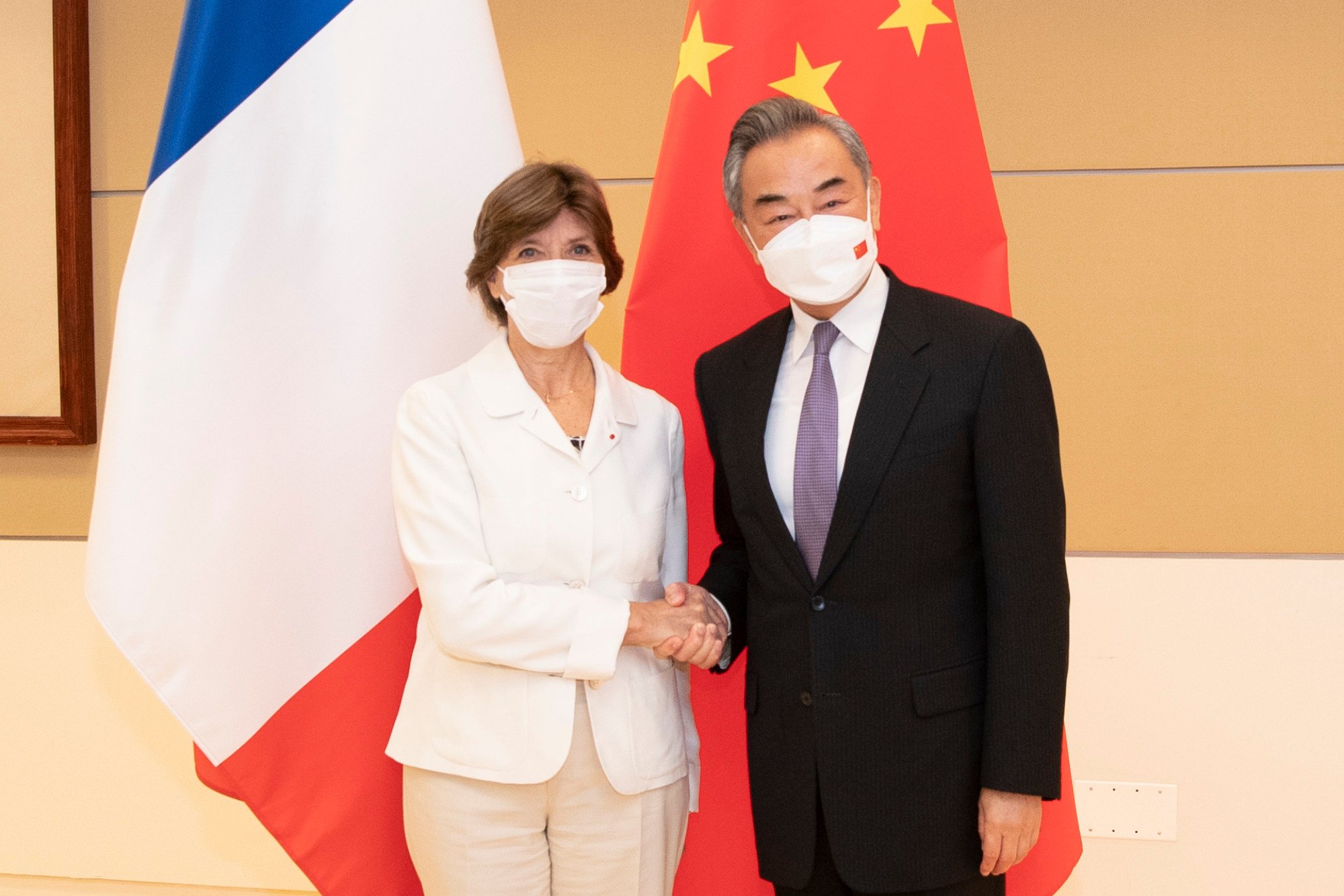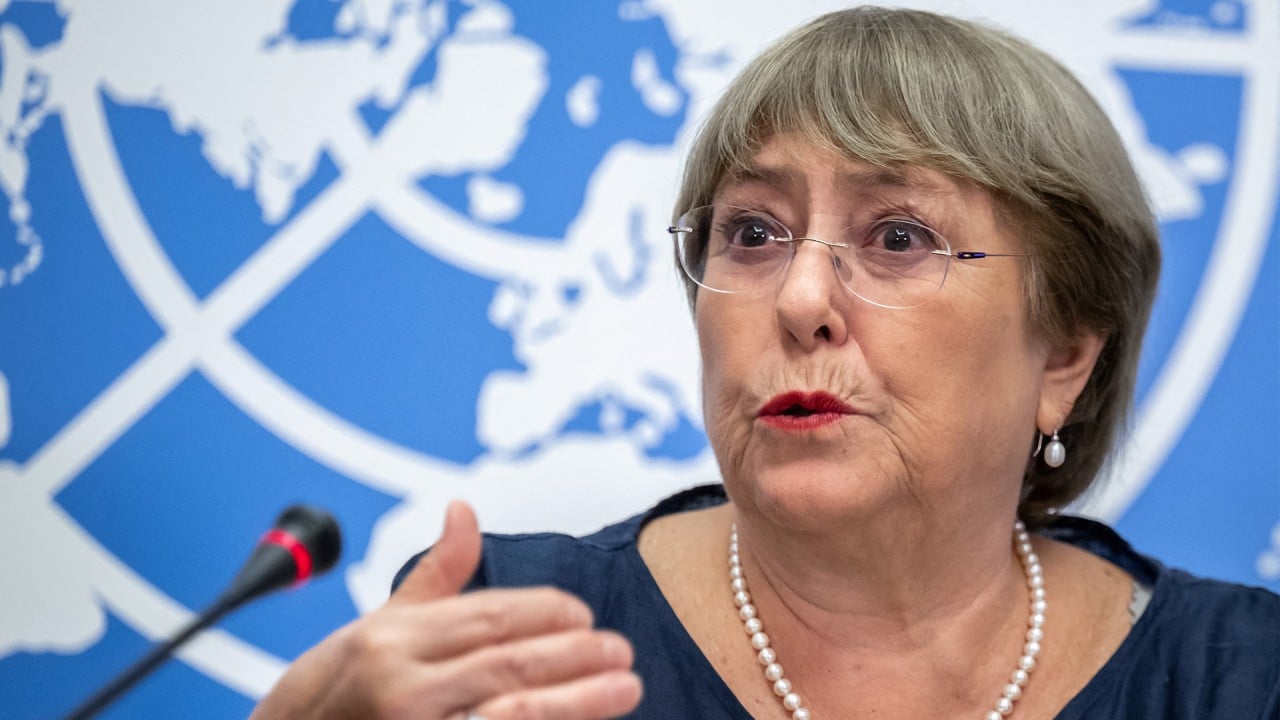
Chinese envoys help plan likely visits to Beijing by French and German leaders
- German Chancellor Olaf Scholz and French President Emmanuel Macron are each expected to meet Chinese President Xi Jinping in separate November trips
- The trips would be the first in three years by European leaders to China after three years of Covid-enforced absence
Chinese envoys have embarked on a diplomatic flurry to lay the groundwork for likely visits to Beijing by leaders of Germany and France later this year.
China’s former ambassador to Germany, Shi Mingde, was in Berlin last week to work out the details of Chancellor Olaf Scholz’s first visit to Beijing as chancellor in November, where he will meet President Xi Jinping, a source familiar with the situation said.
And amid speculation that French President Emmanuel Macron will make a separate trip to visit Xi – also in November – French and Chinese diplomats have engaged in a series of meetings online and in person.
Chinese Foreign Minister Wang Yi met his French counterpart Catherine Colonna at the United Nations in New York on Monday, having already spoken with Macron’s diplomatic adviser Emmanuel Bonne last week.

The South China Morning Post reported in July that China had invited Macron and Scholz, along with the leaders of Italy and Spain.
Noah Barkin, the managing editor of Rhodium Group, first reported the visits on his Twitter page, saying they will take place a week apart.
Having previously dismissed the invitations as “fake news”, China’s foreign ministry spokesman Wang Wenbin said on Wednesday: “At present, I don’t have information to share about this.”
Neither Paris nor Berlin would confirm the trips, with both saying that overseas trips are usually announced a week in advance.

Should the trips take place, they would mark a return to China for Western European leaders after three years of Covid-enforced absence. Macron and Scholz would also be among the first leaders to visit Xi after he is expected to secure a third five-year term as party chief at the Communist Party’s congress in October.
However, in the intervening three years, China’s relationship with Europe has deteriorated significantly.
Tensions have flared over myriad issues: Russia’s invasion of Ukraine; Europe’s sanctioning of Chinese officials over human rights conditions in Xinjiang; an unofficial Chinese blockade of Lithuanian goods; and spiralling concerns over Taiwan.
Analysts said the European leaders will feel pressure not to revert to pre-pandemic behaviour, when official visits to China were often used as junkets to secure business deals.
“Communication symbols are important. In his first term, [Macron’s] first trip to the Indo-Pacific was to China, where he announced, to the surprise of many, that he would visit the country every year,” said Antoine Bondaz, a research fellow at the Fondation pour la Recherche Stratégique, a French think tank.
“It would be important at the beginning of his second term to send a more balanced message, notably by highlighting our Indo-Pacific strategy.”
For Scholz, the pressure is even more acute, with Germany’s entire approach to China now a matter of public debate.
His coalition has become embroiled in a messy row over a bid by the Chinese shipping giant COSCO to take a 35 per cent stake in Hamburg’s container port, the third-largest in Europe.
Economy minister Robert Habeck, the co-leader of a junior coalition party the Greens, said he was inclined to block the purchase.
Cosco set to overtake Hutchison as world’s No 2 ports operator
Hamburg mayor Peter Tschentscher, a member of Scholz’s Social Democratic Party, told Reuters that the dispute would put the port at a disadvantage since rival operators in the Belgian and Dutch ports of Antwerp and Rotterdam have already attracted COSCO investment.
“To keep up with international competition, it must also be possible for shipping companies to participate in terminals in Hamburg if this makes business sense,” he said.
Axel Mattern, chief executive at Port of Hamburg Marketing, said the dispute jeopardised Germany’s reputation as an open economy.
“We live in a free social market economy in which everyone is allowed to invest. If there are political concerns that certain players should only be allowed to invest in the EU to a limited extent, then such an approach must be politically decided and implemented at European level,” he said.
The row comes as the German foreign ministry led by Annalena Baerbock, also of the Greens, devises a new China strategy that is likely to break from past policies.
Germany draws up new China trade policy: ‘Can’t let ourselves be blackmailed’
Numerous reports say government investment guarantees and export credits could be withheld for businesses working in China.
Earlier this year, Volkswagen was denied such a guarantee for a venture in Xinjiang, where the United Nations says the Chinese government may be committing crimes against humanity. China denies the charges.
Pascal Abb, a China researcher at the Peace Research Institute Frankfurt, said that German foreign policy was undergoing a “securitisation” process.
“The port issue is the most visible part of the process of securitisation, where issues that used to be not considered as core security issues are moved into that realm,” Abb said.
“You are cutting back on some relations, especially in the economic realm, that used to be seen as separate from politics – what the Chinese like to call ‘win-win cooperation’– because you have these political disagreements and because there is, in my opinion, an overblown fear of Chinese infrastructure investments undermining national security.”


